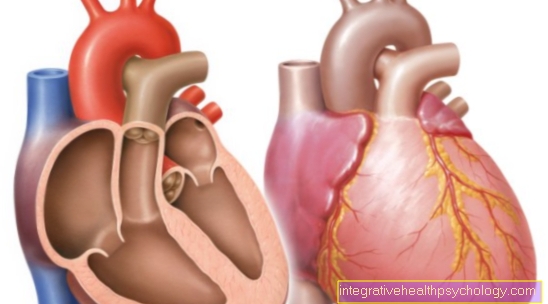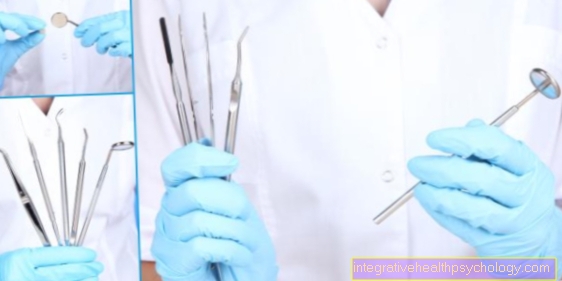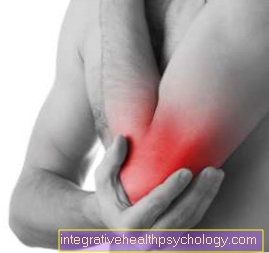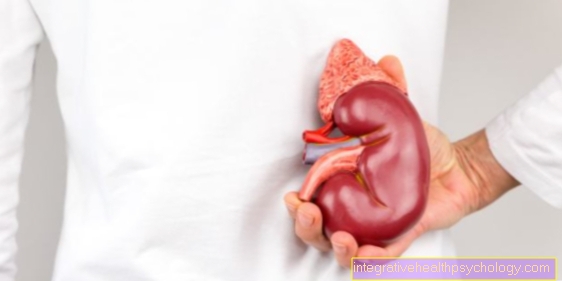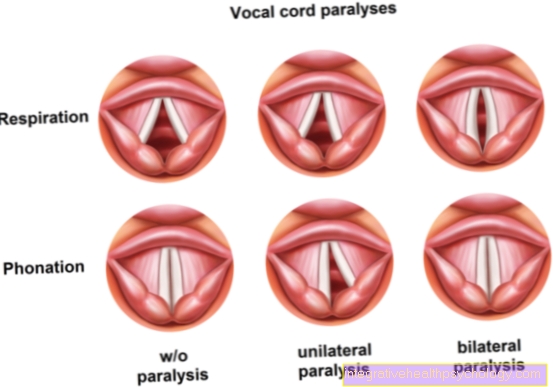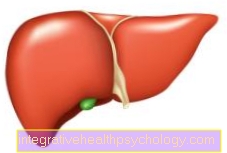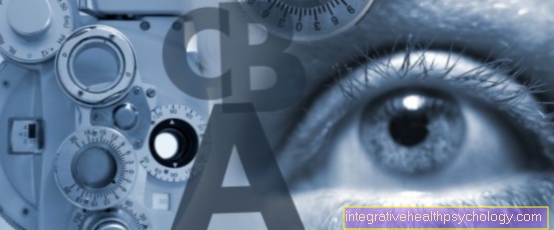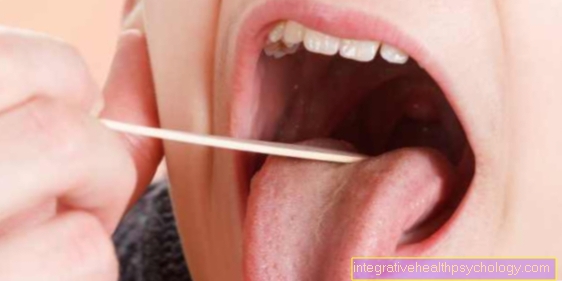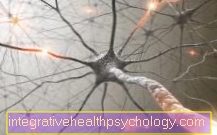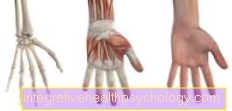Aspirin® Complex
definition
Aspirin® Complex is a combined preparation of the active ingredients acetylsalicylic acid and pseudoephedrine hydrochloride. Due to the different active ingredients, Aspirin® Complex has several properties. It has a pain reliever (analgesic), anti-inflammatory (anti-inflammatory) and also antipyretic (antipyretic).
It is available in the pharmacy without a prescription, either as granules to dissolve or as a hot drink, which also contains eucalyptus and mint, which clears the airways. A hot drink is also beneficial and warming when you have a cold.
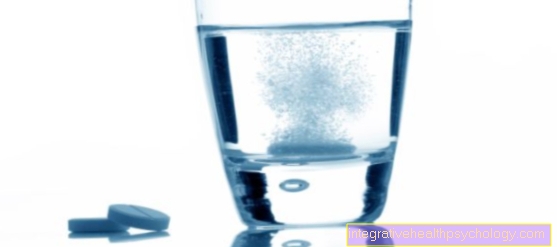
Effect of Aspirin® Complex
The two parts of the Aspirin Complex® have different effects.
Acetylsalicylic acid irreversibly inhibits an enzyme called cyclooxygenase 1. This enzyme is normally responsible for the formation of various signal molecules in the area of pain development, inflammation or blood clotting. If these signal substances are no longer formed through the intake of acetylsalicylic acid, the corresponding signals are missing. The pain is alleviated, the inflammation processes are stopped and the platelets no longer adhere to one another, which inhibits blood clotting.
The second component, the pseudoephedrine hydrochloride, is a sympathomimetic. This means it activates the sympathetic nervous system and thus increases the body's willingness to be active. This effect is based on the fact that it increases the concentration of norepinephrine, which leads to the stimulation of various processes. Among other things, the blood vessels are narrowed by activating certain receptors on their walls. Since the vessels in the area of the nasal mucous membrane also become narrow, it swells. The airways become clearer and you get better air. Because of this, this drug is widely used for colds with runny nose.
Duration of action
The duration of action of the two ingredients of the Aspirin® Complex differ.
The acetylsalicylic acid (aspirin) is converted relatively quickly by the body and is no longer in its original form after just 20 minutes.However, aspirin already works in this short time and the first breakdown products continue to have an effect. This means that the analgesic effect lasts for about four to six hours. Since the adherence of the platelets is irreversibly inhibited by Aspirin®, this effect lasts until the platelets are renewed. The mean survival time of the platelets is seven days, after which the duration of the effect of the Aspirin® ends.
The pseodoephedrine is absorbed within half an hour to two hours, depending on how long ago the last meal was. After that, the proportion in the blood is reduced by half within the next five to eight hours and the effect continues to decrease.
application areas
The drug is suitable for the symptomatic treatment of a Runny nose (Rhinosinusitis) and especially helps with Swelling of the nasal mucosa to make breathing easier. It also works for the common colds fever and pain. In general, Aspirin® complex frees you from head-, neck- and Body aches.
Aspirin® complex can also be taken when you are already first symptoms felt a disease. Under favorable circumstances it can be the beginning of a cold or prevent its outbreak.
What should be considered when taking?
Aspirin® Complex in granulate form is dissolved in a glass of water while stirring, whereby the granulate usually does not dissolve completely. The medicine can regardless of meals be taken.
An intake of Aspirin and alcohol is to be avoidedsince it is the emergence of Stomach ulcer additionally promotes and may limit the ability to react.
When should Aspirin® Complex not be taken?
Aspirin® Complex should not be taken if one allergy against the ingredient Acetylsalicylic acid is known. An allergic reaction can also be triggered if the patient is already allergic to other pain medication.
In addition, you should take other pain-relieving medicines be avoided. A severe hypersensitivity reaction may then occur that may require immediate medical attention. In addition, the constituents of pain relievers are often excreted via the kidneys, so that their function as a detoxification organ can be overwhelmed Kidney failure developed. Even with simultaneous treatment with a chemotherapeutic agent such as Methotrexate Aspirin® Complex should not be taken.
Is there a increased tendency to bleed, treatment with Aspirin® should not take place, as the drug does too blood thinning works and thus increases the risk of bleeding that is difficult to stop. It became a couple of days before an upcoming operation taken, should be discussed again with the attending physician.
Ingestion should continue to be avoided with an existing one pregnancy or during the Lactation. There is also a temporary effect of making it more difficult for women to get pregnant.
Older patients are sometimes more sensitive to this Pseudephedrine. They are reactions in the form of Hallucinations or insomnia known.
The use of Aspirin® Complex by children under 16 years of age should be discussed with the attending physician in advance. Children with a viral infection may experience the Reye's syndrome, a life-threatening situation.
Furthermore, Aspirin® Complex should not be taken in the following diseases:
- Liver and kidney failure
- Heart disease, such as heart failure (Heart failure), narrowed coronary arteries, or severe high blood pressure
- Hyperthyroidism
- Gastric ulcer: Acetylsalicylic acid promotes gastric acid production, which is not indicated if you have a gastric ulcer.
- Diabetes (Diabetes mellitus)
- Gout: Acetylsalicylic acid reduces uric acid excretion and can trigger a gout attack.
Interactions
Drug interactions
Aspirin® Complex can influence its effect when taken at the same time with other medicinal products.
Reinforcing effects can occur with:
- analgesic and anti-inflammatory drugs, e.g. Cortisone.
- Anticoagulant drugs: the blood becomes more thinned.
- Active ingredients such as digoxin, which are taken to strengthen the strength of the heart muscles.
- Blood-sugar-lowering substances: Patients with diabetes mellitus should take into account that the medication works faster. The dose may need to be adjusted here to avoid hypoglycaemia.
- Antidepressants.
- Tablets used to treat epilepsy.
- Methotrexate, a chemotherapy drug.
With other drugs, one occurs Weakening of the effect when taking Aspirin® Complex at the same time. For example, this is the case with Medication for drainage (Diuretics), to Lowering blood pressure (ß-blockers) and to Promote uric acid excretion.
This should be noted when taking Aspirin® Complex.
Aspirin® Complex and alcohol
When taking Aspirin® and alcohol can it to unwanted side effects come, which can sometimes be associated with dangerous consequences for the person concerned.
In particular, the risk of developing Stomach ulcer and Gastric bleeding -Known side effects of taking aspirin - can be caused by the simultaneous consumption of alcohol yet be reinforced.
Irritation of the gastric mucosa, gastric bleeding and gastric ulcers can become noticeable through a variety of typical symptoms. Bleeding in the stomach characteristically go with jet black colored chairs and bloody or coffee grounds Vomit hand in hand. Excessive bleeding can result in significant blood loss and associated symptoms. Chronic gastric ulcers can lead to changes in the gastric outlet and thus Digestive problems and induce vomiting. Stinging are also typical stomach pain which occur especially after eating.
Other side effects that the combination of Aspirin® Complex and alcohol brings with it are, for example, one slowed responsiveness or fatigue. These side effects lead to problems especially in traffic. Although one is not allowed to drive a car under the influence of alcohol and is warned against driving under the influence of medication in the instruction leaflet for Aspirin® Complex, some people still sit behind the wheel. The consequences are traffic accidents with or without personal injury. A limited ability to react due to Aspirin® Complex and alcohol can also result in Operate machines have a negative impact here too slow reactions can quickly lead to injuries.
When it comes to alcohol, you should also be aware that many drugs are a liver damaging effect exhibit. Frequent alcohol consumption, however, also has a harmful effect on the liver, so that the organ can be seriously damaged. It can lead to diseases like Inflammation of the liver (hepatitis) or Liver cancer (Liver carcinoma) come. Hepatitis is often protracted and difficult to treat, while liver cancer is often fatal due to its aggressiveness. In general, it is part of the responsible use of medicines that you use them not at the same time as alcohol occupies.
Read more on this topic at: Aspirin® and alcohol.
Aspirin® Complex and the pill
Many women who take the pill wonder whether other medications will reduce the contraceptive effectiveness of the pill. Aspirin® normally has no effect on the safety of the pill.
However, one should watch out for possible hypersensitivity reactions. If side effects such as diarrhea or vomiting occur as a result of taking Aspirin® Complex, the pill may lose its effectiveness. This then depends on when the pill was taken. If diarrhea and vomiting occur more than six hours after taking the pill, the active ingredients have usually already been absorbed into the body's circulation via the intestines and the pill works normally. At Vomiting or diarrhea within six hours of taking the pill, you should be on the safe side additional contraceptive methods (e.g. condoms) fall back on an unwanted pregnancy to avoid.
You might also be interested in: Aspirin® during pregnancy
dosage
Adults can take up to 2 dissolving sachets at a time. This single dose can be repeated at intervals of 4 to 8 hours. A maximum of 6 sachets can be taken per day.
For Teenagers no dose recommendation has yet been made. It should be taken without consulting the attending physician no longer than 3 days last for.
Overdose
When taking larger amounts of Aspirin® Complex, symptoms such as dizziness, a headache, Palpitations (Tachycardia), Chest pain or Shortness of breath occur. A doctor should then be consulted immediately.
Side effects
Side effects of acetylsalicylic acid
The side effects listed below can be serious and should be taken seriously. Should the patient notice any of the symptoms, he should see a doctor or the nearest hospital as soon as possible.
- Pre-existing stomach ulcers can lead to a gastric perforation, which manifests itself with severe pain and general inflammation symptoms.
- Gastrointestinal bleeding can occur sporadically and lead to a severe lack of iron. They express themselves either as blood-soaked stool or black-colored "tarry stool", or as bloody vomiting.
- Other complaints such as stomach pain, inflammation of the stomach lining, digestive disorders, nausea and diarrhea can also occur.
- Reye's syndrome
This serious complication can be triggered by the use of Aspirin® in children under 16 years of age. It is an acute damage to the brain (Encephalopathy) and the liver. It can occur in children a few days after an upper respiratory tract infection and is triggered, among other things, by treatment with salicylates, including the acetylsalicylic acid in Aspirin®. In the cells, mitochondria malfunction. The symptoms of Reye's syndrome include vomiting, clouding of consciousness, liver dysfunction, convulsions, cerebral edema and even coma. Monitoring and treatment in the intensive care unit is often necessary.
You can find a lot more information under our topic: Reye syndrome
Side effects of pseudoephedrine
This ingredient in the Aspirin® Complex can also trigger serious side effects. This includes Racing heart and a Increase in blood pressure. Furthermore you can Urinary retention, Hallucinations and insomnia occur. A allergic reaction with itching of the skin and drop in blood pressure is also possible.
If the patient notices one of the side effects mentioned here, he should stop using the granules immediately and consult a doctor.
Aspirin® complex- a doping agent?
The substance pseudoephedrine hydrochloride, which is contained in Aspirin® Complex, is seen as a doping agent and is therefore not allowed in many competitions. This is due to the fact that pseudoephedrine over-stimulates and can uplift the body.
Activating the sympathetic nervous system increases the concentration of norepinephrine. This leads to the fact that, among other things, vessels become narrowed and thus the blood pressure is increased. The heart rate is also accelerated.
This increases the blood flow to the body and consequently the strength and reserves that are available to the body during competition. The vessels in the airways are also narrowed, the mucous membranes swell and breathing becomes easier.
Pseudoephedrine also acts on and stimulates central receptors in the brain. Through all these processes the body is driven in an unnatural way in its activity and performance.
This is not permitted in competition and can cause serious side effects such as palpitations, shortness of breath, unconsciousness or cramps, especially in the event of an overdose. Another point that makes Aspirin® Complex dangerous before competitions is the pain-relieving effect of Aspirin®. Pain that occurs during sport is masked and injuries can occur more frequently if you do not take care of yourself.






